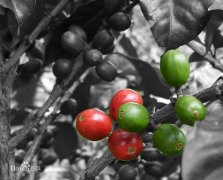The characteristics of mocha coffee beans A brief introduction to mocha coffee beans the origin of mocha coffee beans
Mocha beans are smaller than most coffee beans, which makes them look like peas-in fact, peaberrybeans are sometimes referred to as mocha beans. Mocha coffee beans are similar in appearance to Ethiopian Harrar coffee beans, which are small in size, high in acidity, and mixed with a strange and indescribable spicy flavor. Careful tasting can also discern a hint of chocolate, so attempts to add chocolate to coffee are a natural progression.
In Yemen, coffee growers plant poplars to give coffee the shade it needs to grow. As in the past, the trees were planted on steep terraces to maximize use of less rainfall and limited land resources. In addition to tipika and bourbon coffee trees, more than a dozen different coffee species originating in Ethiopia are cultivated in Yemen. But even good coffee, such as premium mocha coffee, dries and the rind remains attached to the beans. Yemen has until now often used traditional stone mills to remove the dry hard husks, which makes the beans irregular in shape and often damages the beans.
Although Yemeni coffee is of good quality and creamy aroma, it has its drawbacks: quality is not always guaranteed and the classification of beans is uncertain. Traditionally, Yemen's best coffee beans come from Mattari, followed by Sharki and then Sanani. These beans are low in caffeine and are exported from December to April. There has been a problem in the past with coffee from the north being adulterated before it is shipped from the southern port of Aden. Only coffee shipped from the port of Hodeida can be identified as genuine northern origin. Yemeni coffee is mostly grown naturally, mainly because growers lack funds.

Important Notice :
前街咖啡 FrontStreet Coffee has moved to new addredd:
FrontStreet Coffee Address: 315,Donghua East Road,GuangZhou
Tel:020 38364473
- Prev

Fragrant with less acidity, reminiscent of Central American coffee beans
It is fragrant with less acidity, reminiscent of coffee beans from Central America. Coffee production in South Africa (SouthAfrica) is mainly in the northeast of the country, from Natal between Transvaal and Mozambique, extending northward to Transvaal, with a southernmost limit of latitude 30 south. Further south, coffee cannot be grown due to the harm of early frost.
- Next

Characteristics of Indonesian coffee beans Origin of Indonesian coffee beans
Coffee that makes you feel refreshed and ready to drink. Coffee is produced throughout Indonesia (Indonesia), and Java occupies an extremely important position in coffee history. In the mid-17th century, coffee trees were introduced to Indonesia by the Dutch (some official sources believe that earlier). The first batch of coffee from Java was sold to Amsterdam in 1712. However, in 1877
Related
- Does Rose Summer choose Blue, Green or Red? Detailed explanation of Rose Summer Coffee plots and Classification in Panamanian Jade Manor
- What is the difference between the origin, producing area, processing plant, cooperative and manor of coffee beans?
- How fine does the espresso powder fit? how to grind the espresso?
- Sca coffee roasting degree color card coffee roasting degree 8 roasting color values what do you mean?
- The practice of lattes: how to make lattes at home
- Introduction to Indonesian Fine Coffee beans-- Java Coffee producing area of Indonesian Arabica Coffee
- How much will the flavor of light and medium roasted rose summer be expressed? What baking level is rose summer suitable for?
- Introduction to the characteristics of washing, sun-drying or wet-planing coffee commonly used in Mantenin, Indonesia
- Price characteristics of Arabica Coffee Bean Starbucks introduction to Manning Coffee Bean Taste producing area Variety Manor
- What is the authentic Yega flavor? What are the flavor characteristics of the really excellent Yejasuffi coffee beans?

